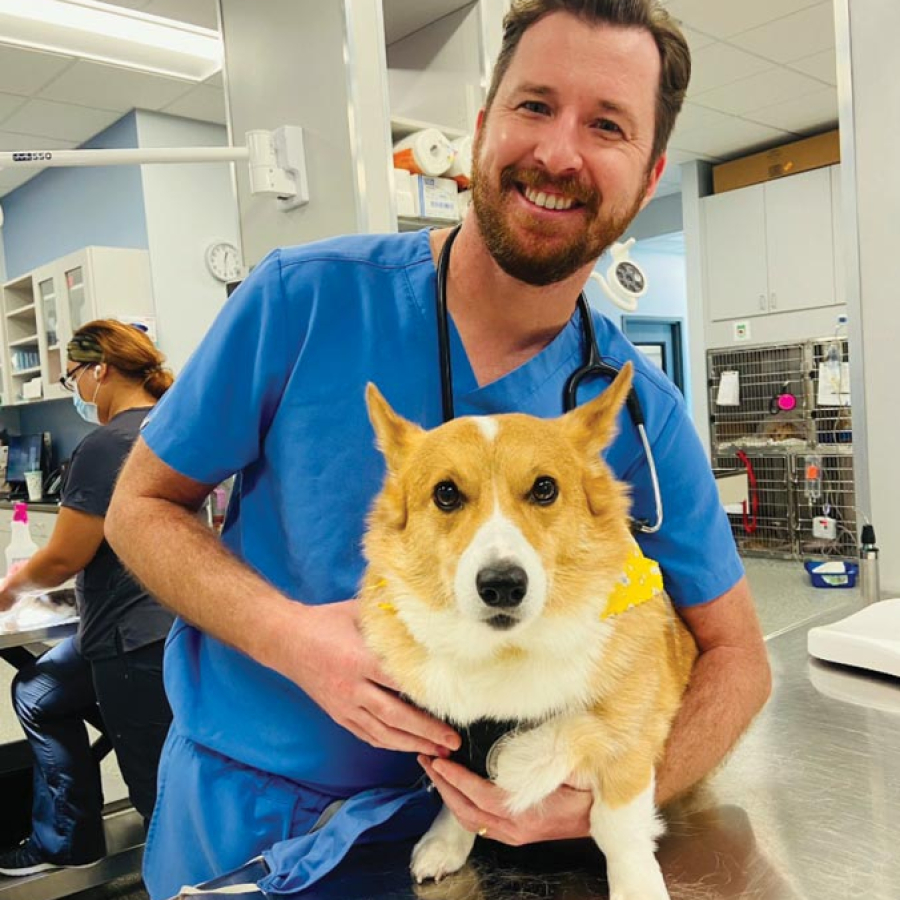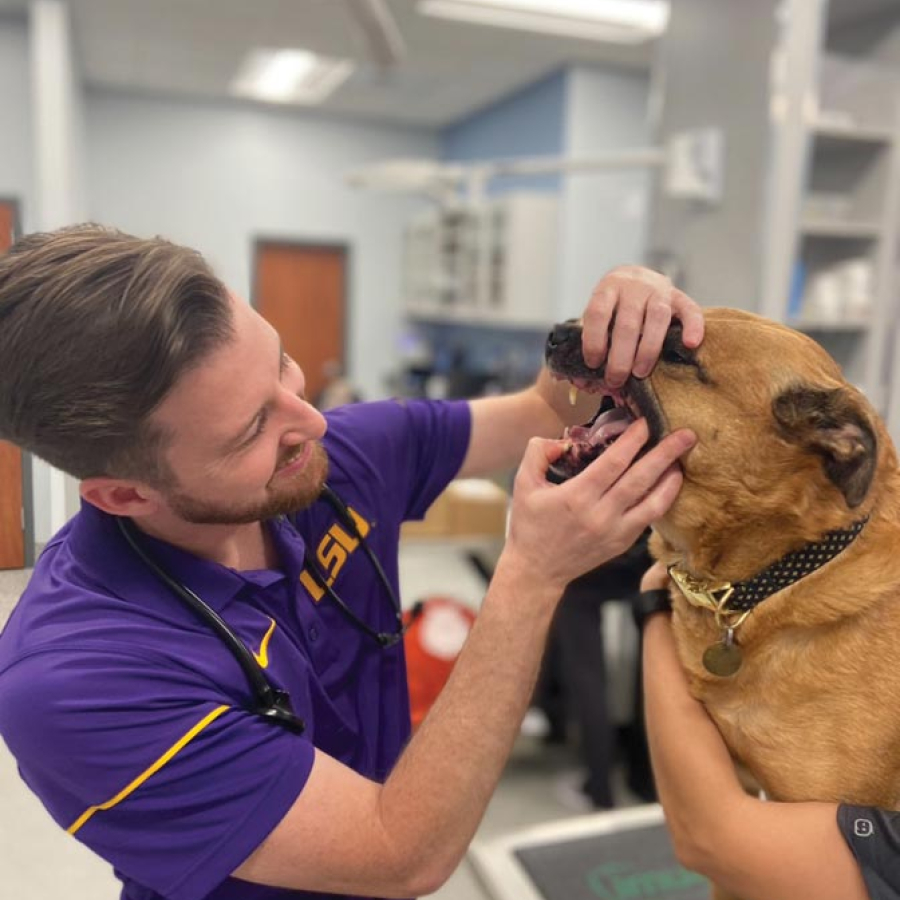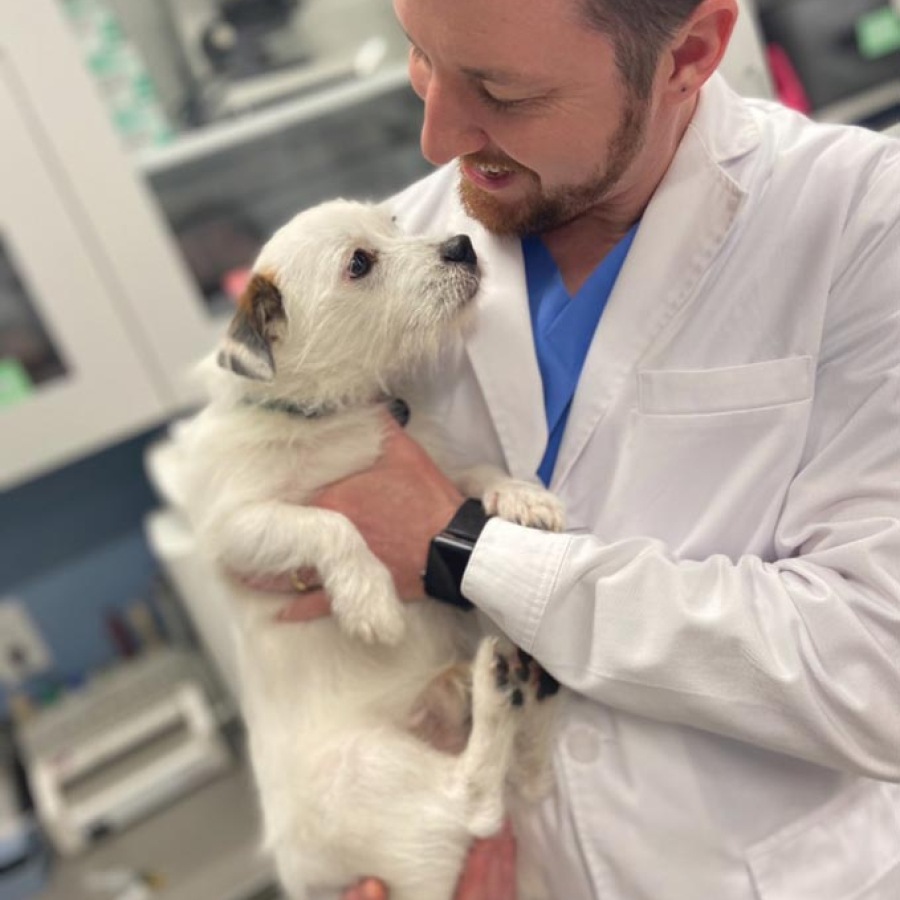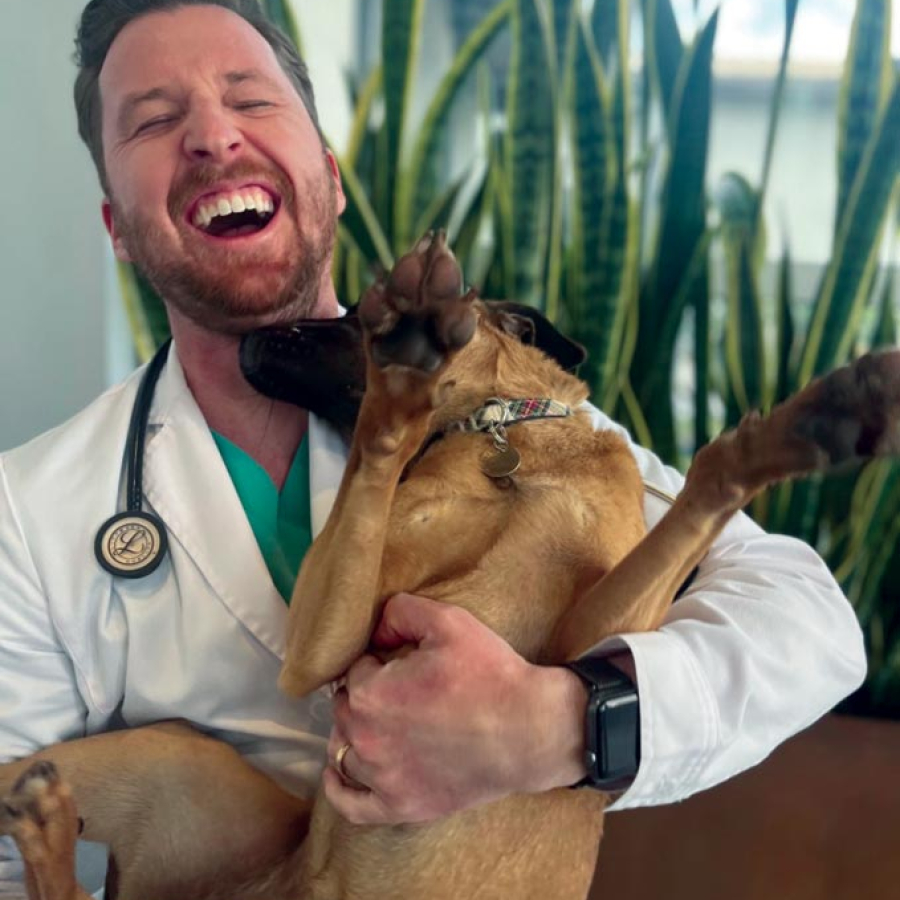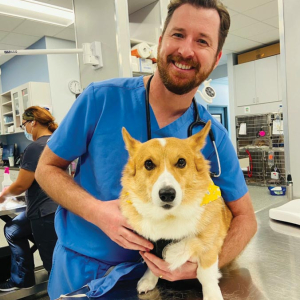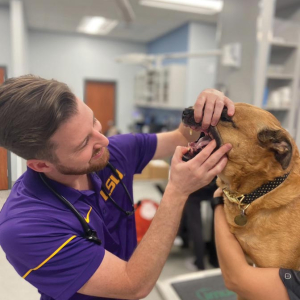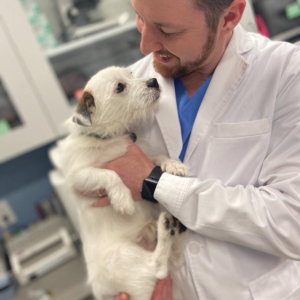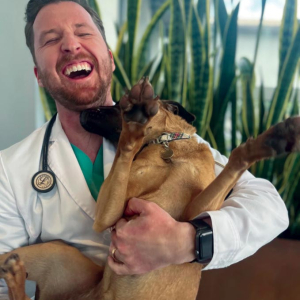Dr. Zachary Carroll earned his DVM at Ross University School of Veterinary Medicine in 2012 and completed his clinical year at Auburn University. Following veterinary school, he completed a one-year rotating internship at MedVet New Orleans. Dr. Carroll feels that his internship not only gave him the opportunity to work closely with boarded specialists, but also helped him gain invaluable knowledge and experience.
In 2014, he joined the team at Ark Animal Hospital at 4211 Jefferson Hwy, where his philosophy is to treat each patient as if it were his own pet. Dr. Carroll’s practice interests include internal medicine, ultrasound, soft tissue surgery, anesthesia/pain management and oncology.
Outside of the hospital, Dr. Carroll enjoys spending time with his wife Alida, their son Conrad, daughter Blair and their pets Dixie and Roux. You may see Roux at the clinic; she loves to come play every day! In addition, Dr. Carroll loves to be outdoors, whether it is golfing or attending a music festival.
In speaking with Dr. Carroll, he stressed that better care means our dogs and cats are living longer now than they ever have before. As pets get older, they need extra care and attention. It’s important to remember that age is not a disease. Although senior pets may develop age-related problems, you can help your pet live a happy, healthy, and active life in their senior years by providing for their physical, mental and healthcare needs. Regular veterinary examinations can detect problems in older pets before those problems become serious or life-threatening, leading to a longer, healthier life for your pet.
Cats are generally considered “senior” after ten years of age. However, dogs don’t have a universal age of seniority because of their wider variety in size. Larger breed dogs tend to have shorter life spans than smaller breeds.
No matter how well cared for, senior pets are vulnerable to aging-related issues, including certain diseases. This means that senior pets require more attention than younger pets, including more frequent visits to the veterinarian as well as possible changes in their diet and home environment.
Here are some basic considerations when caring for senior pets:
• Increased veterinary care: Senior pets need to see a veterinarian twice a year or more so signs of illness or other problems can be found and treated early, before they become bigger problems. Senior pet exams are similar to those for younger pets but more in-depth. These exams may include dental care, possible bloodwork and specific checks for signs of aging-related diseases.
• Diet and nutrition: Senior pets often need foods that are more easily digested, provide different energy levels and ingredients and contain anti-aging nutrients.
• Weight control: Weight gain in senior dogs increases the risk of health problems, whereas weight loss is a bigger concern for senior cats.
• Parasite control: Senior pets’ immune systems aren’t as strong as those of younger pets. As a result, senior pets may not be able to fight off parasites or heal as quickly.
• Vaccinations: A weaker immune system means senior pets also might have different vaccination needs than younger pets.
• Maintaining mobility: Pets can become less active with age. Keeping senior pets active through appropriate exercise helps them stay healthier and more mobile.
• Mental health: Senior pets can show signs of senility or cognitive dysfunction. Stimulating them through interactions can help keep them mentally active.
• Environment: Senior pets may need changes in their lifestyle, such as new sleeping areas to avoid stairs, more time indoors, etc.
• Reproductive diseases: Non-neutered/non-spayed senior pets are at higher risk of breast, testicular, and prostate cancers.
While it’s easy to spot the outward signs of aging such as a graying haircoat and a slower pace, it’s important to remember a pet’s body is also changing on the inside. Senior pets are more likely to develop certain health problems. Cancer is the cause of death in almost half of dogs and about a third of cats over ten years old. Some signs of cancer to look out for include abdominal swelling, bleeding from the mouth, nose, or other body openings, difficulty eating, swallowing, or breathing, lumps, bumps, or discolored skin, sores that don’t heal, persistent diarrhea or vomiting, decreased appetite or body weight and unexplained swelling, heat, pain or lameness.
Some of the other most common health problems as pets age include heart disease, kidney or urinary tract disease, liver disease, diabetes, joint or bone disease, obesity and vision or hearing loss. It is normal for pets to lose some of their sight and hearing as they age, similar to people. Senior pets might develop cataracts affecting their vision, and they might not respond as well to voice commands. Pets with poor eyesight or even blindness can still get around well as long as they are familiar with their surroundings. If your pet’s eyesight is failing, avoid rearranging or adding furniture or other items that could become obstacles.
Teaching your pet hand signals at a younger age might make it easier for you to communicate with your pet as their hearing worsens with age. Training them to respond to simple gestures that indicate “come” or “stop” can allow you to safely retain control of your pet without the use of words.
Behavior changes in your pet can be the first signs of aging. These changes might be due to discomfort or pain as with arthritis, worsening sight or hearing, certain diseases or just the normal aging process. A type of brain impairment called “cognitive dysfunction,” similar to senility in people, may be responsible. Common behavior changes in senior pets with cognitive dysfunction include increased reaction to strange or loud sounds, increased barking/meowing, increased aggressive/protective behavior, increased anxiety, appearing disoriented or confused, increased wandering, “accidents” in the home, changes in sleep patterns, less interest in playing, repeating an action often, decreased response to voice commands or poorer memory and learning ability. If your pet is showing these behavior changes or other warning signs of disease, contact your veterinarian and let them know the specific changes you’ve seen. Sometimes, the changes may seem contradictory, such as signs of hearing loss but increased sensitivity to strange sounds. Certain diets, medications, and opportunities to interact with their environment can help support brain function in senior pets. Your veterinarian can recommend which ones might be right for your pet.
Changes in your pet’s activity level can be a warning sign of underlying disease. A common cause of activity change is arthritis. You may notice that your pet is starting to avoid activities like running, jumping, climbing stairs, or getting into cars. Other signs of arthritis include favoring a leg, walking stiffly, difficulty sitting down or standing up, sleeping more, resisting being petted, playing less or showing unusual aggression towards people or other pets.
Advances in veterinary medicine have made it easier to diagnose and effectively treat arthritis and other aging-related diseases. Your veterinarian can recommend the best tests to determine why your pet’s activity level or other behaviors have changed. Once the cause is determined, your veterinarian can recommend the most effective treatment.
If your pet has arthritis, simple changes or additions to your home can help them feel more comfortable. Orthopedic pet beds, raised feeding platforms and pet stairs and ramps can help alleviate symptoms.
Excess weight can have a major effect on a senior pet’s health. Obesity in senior pets is linked to an increased risk of arthritis, difficulty breathing, insulin resistance or diabetes, heart disease, high blood pressure, skin problems, cancer and other conditions. An overweight pet may not show any early warning signs of health problems, which is one reason why regular visits to your veterinarian are so important. Once your veterinarian evaluates your pet’s condition, they can recommend diet and other changes to help set up your pet for a long, healthy and comfortable life.
On the other hand, sudden weight loss in a senior pet often means something is wrong, especially in cats. Hyperthyroidism, which is an overactive thyroid gland, cancer, diabetes, and kidney disease are common causes. If you notice any sudden changes in your pet’s weight, contact your veterinarian.
It may be tempting to bring a new pet, especially a puppy or kitten, into your home as your pet gets older. It’s a good idea to first consult with your veterinarian to ensure the best outcome for your pet and your family. Ideally, a new pet would be introduced when your senior pet is still active and can move away if a “time-out” is needed. Senior pets need to know they have a quiet, secure place where they can walk away and rest, undisturbed, in comfort.
Dr. Carroll would be glad to help you with your aging pet or any other issues you may have. Feel free to call 504-834-0906 to set up an appointment for a consultation regarding your concerns.
In 2014, he joined the team at Ark Animal Hospital at 4211 Jefferson Hwy, where his philosophy is to treat each patient as if it were his own pet. Dr. Carroll’s practice interests include internal medicine, ultrasound, soft tissue surgery, anesthesia/pain management and oncology.
Outside of the hospital, Dr. Carroll enjoys spending time with his wife Alida, their son Conrad, daughter Blair and their pets Dixie and Roux. You may see Roux at the clinic; she loves to come play every day! In addition, Dr. Carroll loves to be outdoors, whether it is golfing or attending a music festival.
In speaking with Dr. Carroll, he stressed that better care means our dogs and cats are living longer now than they ever have before. As pets get older, they need extra care and attention. It’s important to remember that age is not a disease. Although senior pets may develop age-related problems, you can help your pet live a happy, healthy, and active life in their senior years by providing for their physical, mental and healthcare needs. Regular veterinary examinations can detect problems in older pets before those problems become serious or life-threatening, leading to a longer, healthier life for your pet.
Cats are generally considered “senior” after ten years of age. However, dogs don’t have a universal age of seniority because of their wider variety in size. Larger breed dogs tend to have shorter life spans than smaller breeds.
No matter how well cared for, senior pets are vulnerable to aging-related issues, including certain diseases. This means that senior pets require more attention than younger pets, including more frequent visits to the veterinarian as well as possible changes in their diet and home environment.
Here are some basic considerations when caring for senior pets:
• Increased veterinary care: Senior pets need to see a veterinarian twice a year or more so signs of illness or other problems can be found and treated early, before they become bigger problems. Senior pet exams are similar to those for younger pets but more in-depth. These exams may include dental care, possible bloodwork and specific checks for signs of aging-related diseases.
• Diet and nutrition: Senior pets often need foods that are more easily digested, provide different energy levels and ingredients and contain anti-aging nutrients.
• Weight control: Weight gain in senior dogs increases the risk of health problems, whereas weight loss is a bigger concern for senior cats.
• Parasite control: Senior pets’ immune systems aren’t as strong as those of younger pets. As a result, senior pets may not be able to fight off parasites or heal as quickly.
• Vaccinations: A weaker immune system means senior pets also might have different vaccination needs than younger pets.
• Maintaining mobility: Pets can become less active with age. Keeping senior pets active through appropriate exercise helps them stay healthier and more mobile.
• Mental health: Senior pets can show signs of senility or cognitive dysfunction. Stimulating them through interactions can help keep them mentally active.
• Environment: Senior pets may need changes in their lifestyle, such as new sleeping areas to avoid stairs, more time indoors, etc.
• Reproductive diseases: Non-neutered/non-spayed senior pets are at higher risk of breast, testicular, and prostate cancers.
While it’s easy to spot the outward signs of aging such as a graying haircoat and a slower pace, it’s important to remember a pet’s body is also changing on the inside. Senior pets are more likely to develop certain health problems. Cancer is the cause of death in almost half of dogs and about a third of cats over ten years old. Some signs of cancer to look out for include abdominal swelling, bleeding from the mouth, nose, or other body openings, difficulty eating, swallowing, or breathing, lumps, bumps, or discolored skin, sores that don’t heal, persistent diarrhea or vomiting, decreased appetite or body weight and unexplained swelling, heat, pain or lameness.
Some of the other most common health problems as pets age include heart disease, kidney or urinary tract disease, liver disease, diabetes, joint or bone disease, obesity and vision or hearing loss. It is normal for pets to lose some of their sight and hearing as they age, similar to people. Senior pets might develop cataracts affecting their vision, and they might not respond as well to voice commands. Pets with poor eyesight or even blindness can still get around well as long as they are familiar with their surroundings. If your pet’s eyesight is failing, avoid rearranging or adding furniture or other items that could become obstacles.
Teaching your pet hand signals at a younger age might make it easier for you to communicate with your pet as their hearing worsens with age. Training them to respond to simple gestures that indicate “come” or “stop” can allow you to safely retain control of your pet without the use of words.
Behavior changes in your pet can be the first signs of aging. These changes might be due to discomfort or pain as with arthritis, worsening sight or hearing, certain diseases or just the normal aging process. A type of brain impairment called “cognitive dysfunction,” similar to senility in people, may be responsible. Common behavior changes in senior pets with cognitive dysfunction include increased reaction to strange or loud sounds, increased barking/meowing, increased aggressive/protective behavior, increased anxiety, appearing disoriented or confused, increased wandering, “accidents” in the home, changes in sleep patterns, less interest in playing, repeating an action often, decreased response to voice commands or poorer memory and learning ability. If your pet is showing these behavior changes or other warning signs of disease, contact your veterinarian and let them know the specific changes you’ve seen. Sometimes, the changes may seem contradictory, such as signs of hearing loss but increased sensitivity to strange sounds. Certain diets, medications, and opportunities to interact with their environment can help support brain function in senior pets. Your veterinarian can recommend which ones might be right for your pet.
Changes in your pet’s activity level can be a warning sign of underlying disease. A common cause of activity change is arthritis. You may notice that your pet is starting to avoid activities like running, jumping, climbing stairs, or getting into cars. Other signs of arthritis include favoring a leg, walking stiffly, difficulty sitting down or standing up, sleeping more, resisting being petted, playing less or showing unusual aggression towards people or other pets.
Advances in veterinary medicine have made it easier to diagnose and effectively treat arthritis and other aging-related diseases. Your veterinarian can recommend the best tests to determine why your pet’s activity level or other behaviors have changed. Once the cause is determined, your veterinarian can recommend the most effective treatment.
If your pet has arthritis, simple changes or additions to your home can help them feel more comfortable. Orthopedic pet beds, raised feeding platforms and pet stairs and ramps can help alleviate symptoms.
Excess weight can have a major effect on a senior pet’s health. Obesity in senior pets is linked to an increased risk of arthritis, difficulty breathing, insulin resistance or diabetes, heart disease, high blood pressure, skin problems, cancer and other conditions. An overweight pet may not show any early warning signs of health problems, which is one reason why regular visits to your veterinarian are so important. Once your veterinarian evaluates your pet’s condition, they can recommend diet and other changes to help set up your pet for a long, healthy and comfortable life.
On the other hand, sudden weight loss in a senior pet often means something is wrong, especially in cats. Hyperthyroidism, which is an overactive thyroid gland, cancer, diabetes, and kidney disease are common causes. If you notice any sudden changes in your pet’s weight, contact your veterinarian.
It may be tempting to bring a new pet, especially a puppy or kitten, into your home as your pet gets older. It’s a good idea to first consult with your veterinarian to ensure the best outcome for your pet and your family. Ideally, a new pet would be introduced when your senior pet is still active and can move away if a “time-out” is needed. Senior pets need to know they have a quiet, secure place where they can walk away and rest, undisturbed, in comfort.
Dr. Carroll would be glad to help you with your aging pet or any other issues you may have. Feel free to call 504-834-0906 to set up an appointment for a consultation regarding your concerns.
Tagged in What's Up Doc in our Spring 2023 issue

